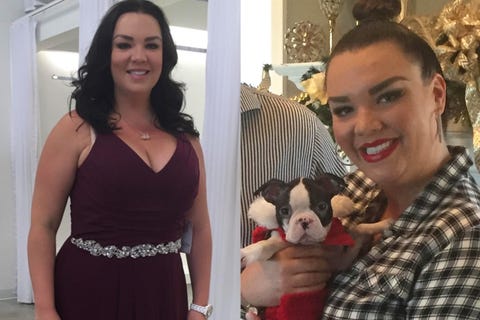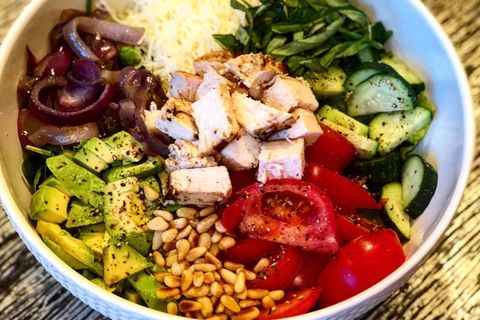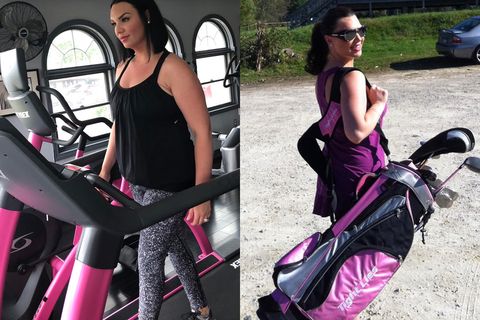I Switched From Veganism To The Keto Diet And Lost 60 Pounds
Author: Danielle Page as told by Katie Boyd
July 18th, 2018 • 4 min read

I started competing in pageants at age 4, and eventually became the number-one pageant trainer in the country. My industry comes with extreme pressure to be thin, so, for a long time, I worked hard to keep up appearances.
That all changed when I got married in 2014. It was wonderful—I felt like I was finally able to relax, after meeting someone who loved me for who I was on the inside, not just the outside—but I also lost interest in my healthy, active lifestyle.
My life felt like a constant celebration—constantly eating out or having a few cocktails each night—which was a whole lot of fun, but not good for my body (or emotional and mental health). A lower back injury from a car accident around this time also made workouts painful.
Basically, it was the perfect storm. I slowly fell into a rut—and the thing about ruts is that one day you just wake up and you're there.
Here's the thing: I knew exactly why I was gaining weight—and I still couldn't stop.
Years of pageant coaching led me to be come a sort of health coach for my clients. I'd tell them to eat at home, for example, because that way you can control what goes into your food.

But the busy schedules that my husband and I kept meant we were eating out constantly. (French fries sound way better than a salad when you're tired and overwhelmed from working a 16-hour day.)
I was also vegan, which was not helping me—all I ate was carbs, which made me feel constantly hungry, tired, and grouchy.
When I didn't recognize the person looking back at me in the mirror, I knew I had to change.
My husband loves to take tropical vacations, and it made me so insecure to be on the beach or at a pool in my swimsuit. When someone would ask what I did for a living and I responded that I was a pageant coach, they'd look at me, puzzled—all of this just reinforced that I had to do something differently.
At first, I tried going pescatarian. Adding fish back into my diet slowly helped my body make the transition out of veganism
After about six months following a pescatarian diet, I eased into paleo—adding chicken or beef to my diet, and taking away most of the carbs. After six more months of that, I began to feel better and more focused—but I'd only lost a few pounds.
Since I'd worked so hard on getting meat back into my diet, I decided to give something else a shot: the keto diet.
My body started changing dramatically on the keto diet.
A quick primer on the keto diet if you're not familiar with it: It's a high-fat, low-carb, moderate-protein diet that forces your body into a state of ketosis (where you burn fat instead of carbs).

It was tough at first (I had to cut out my beloved starchy carbs, along with any sweets), but eventually I got the swing of things and actually started to enjoy it. I lost about 35 pounds in the first six months.
Here's what a typical day of eating on the keto diet looks like for me:
- Breakfast: coffee with grass-fed and organic butter or ghee with MCT oil.
- Lunch: a huge salad with arugula, romaine lettuce, and mixed greens with goat cheese, caramelized onions, organic grilled lemon and rosemary chicken, pecans and homemade balsamic vinaigrette dressing.
- Dinner: roasted salmon crusted with crushed pecans and dijon mustard with asparagus topped with truffle oil.
- Snacks: keto bark (a mixture of Lily's chocolate with coconut oil, crushed macadamia nuts, and unsweetened shredded coconut flakes).
Once I started losing weight, I felt comfortable working out again, too.
I found an incredible orthopedic doctor who sent me to physical therapy for my back injury, and I also started getting cortisone injections and other treatments to help with my pain.

I was able to start working out slowly—about three days a week at the gym, doing a mixture of light weights and slow-but-steady cardio. After a few months of this, I lost another 15 pounds.
Keto isn't always easy.
Sometimes I slide backward and eat something that isn't keto-approved—but I don't punish myself for it. I just tell myself tomorrow is a brand-new day and I get to start fresh.
I also never feel deprived on keto—which is huge for my happiness. I always make sure to have tasty keto snacks on hand: single-serving guacamole, Moon Cheese, Epic Bars—I even get to have tasty pork rinds. And, while I do a lot of my own cooking at home, I always make sure to check restaurant menus beforehand when I decide to treat myself to a dinner out.
But it's not just about the weight loss—doing keto and making a commitment to exercise helped me start putting myself first, which ultimately made me a healthier, happier person overall.
This article was originally posted here
Change Your Life With Us
healthfulinspired.comFind Inspiration
WEIGHT LOSS STORIESStay Physically Confident
WORKOUTS CURATED FOR WEIGHT LOSSNever Fall Behind
WEIGHT LOSS ARTICLES, CONTENT AND TIPSSubscribe
Become a subscriber today to start receiving newsletters of the latest, best trending health content delivered straight to your inbox. (You only need to enter your email)
Amazon Associates Disclosure
We are a participant in the Amazon Services LLC Associates Program, an affiliate advertising program designed to provide a means for us to earn fees by advertising linking to Amazon.com and affiliated sites.